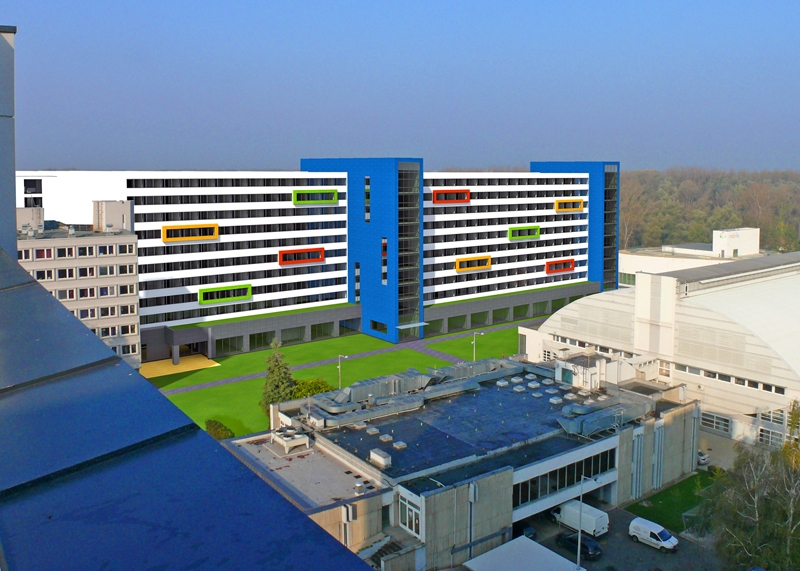MASTERS IN INFRASTRUCTURAL ENGINEERING
Faculty of Architecture, Civil Engineering and Transport Sciences
| Name of qualification and level | Duration of studies | Intake | Necessary no. credits for degree | Tuition fee | Application fee | Supervisor | Programme mentor |
|---|---|---|---|---|---|---|---|
| Infrastructural Engineer (MSc) | 3 semesters – full time programme | September | 90 credits | 3,200 EUR / semester | 100 EUR / application |
Dr Attila Borsos |
Dr Attila Borsos |
This programme is intended for students who want to become more experienced in the design, construction and maintenance of the infrastructure, more specifically transportation systems, roadways, railways, foundations, and earthquake engineering. The programme allows the student to focus on either transportation infrastructure or geotechnical engineering, or both.
Structure of studies
The total number of credits needed to complete the programme is 90 credits. The courses of the programme are divided into three categories: compulsory courses (60 credits), thesis courses (20 credits) and elective courses (10 credits). 1 credit equals one ECTS credit, and 1 credit is defined as 25 student working hours.
Language requirements
TOEFL 513 / IELTS 5.5 /oral examination, TOEFL IBT test score of 66 or any standardised international English language exam corresponding with Hungarian B2 at the Bachelors level and C1 at Masters level.
If there is no standardised English exam, the University relies on an online interview. Applicants not complying with language requirements must enrol in a preparatory language programme. After having completed the language course and passed the requisite final examination, if there are no professional reservations on the part of the Faculty, admission to the selected Bachelor's programme is automatic.
Academic requirements
Completed and signed application form, copy of your passport, notarized copy of Bachelor’s degree relevant* to the Master's studies, notarized copy of the Transcript of Records, notarized copy of your language certificate, recent photograph, Curriculum Vitae (resumé) in English, Motivational Letter in English, Academic Reference letter in English (Issued by your former academic institution/teacher)
Specialization
Transportation infrastructure, Geotechnical
Programme educational objectives:
The MSc in Infrastructural Engineering programme at Széchenyi István University is meticulously crafted to empower graduates with the expertise, capabilities and qualities essential for thriving in the realm of civil engineering infrastructure. Our programme sets forth the following programme educational objectives (PEOs):
PEO#1: Graduates will demonstrate exceptional proficiency in crafting innovative solutions to complex infrastructural challenges within the field of civil engineering.
PEO#2: Graduates will be prepared to enter a further graduate programme in Civil Engineering or enter professional practice in their recognized specialty.
PEO#3: Graduates will uphold the highest ethical standards, actively contributing to societal welfare through their projects and advancing professionally in their careers.
PEO#4: Graduates will be prepare to lead and manage multidisciplinary teams, oversee infrastructure projects and make informed decisions balancing technical, economic, environmental and social factors.
These PEOs should reflect the specific aims and objectives of the MSc in Infrastructure – Civil Engineering programme and guide graduates towards achieving success in their careers and contributing to the field of civil engineering.
Student Outcomes:
The student outcomes (SOs) of our programme represent the skills, knowledge and behaviours that our curriculum aims to impart to our students. The MSc in Infrastructural Engineering programme defines seven SOs (1) to (7) to guide student development as follows:
- An ability to identify, formulate and solve complex engineering problems by applying principles of engineering, science and mathematics.
- An ability to apply engineering design to produce solutions that meet specified needs with consideration of public health, safety and welfare, as well as global, cultural, social, environmental and economic factors.
- An ability to communicate effectively with a range of audiences.
- An ability to recognize ethical and professional responsibilities in engineering situations and make informed judgments, which must consider the impact of engineering solutions in global, economic, environmental and societal contexts.
- An ability to function effectively on a team whose members together provide leadership, create a collaborative and inclusive environment, establish goals, plan tasks and meet objectives.
- An ability to develop and conduct appropriate experimentation, analyse and interpret data and use engineering judgment to draw conclusions.
- An ability to acquire and apply new knowledge as needed, using appropriate learning strategies.
Job opportunities:
Upon completion of the Master's degree, the graduate will be able to find employment in the following areas: coordinating and managing construction, maintenance and operation, contracting and technical authority tasks in the fields of transport construction, hydraulic engineering and geotechnics; contributing to the design of infrastructure facilities, solving problems related to complex road, rail and urban transport systems, participating in research and development in the fields of transport construction, hydraulic engineering and geotechnics. The trainees typically work in large civil engineering companies, medium-sized design firms or in organisations involved in the maintenance and operation of facilities. Students with good results in the Infrastructure Engineering course may be admitted to a doctoral programme






